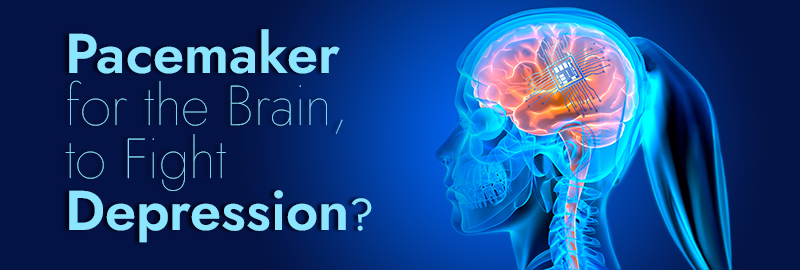Closed-loop Neuromodulation in an Individual with Treatment-Resistant Depression
Meriam-Webster defines depression as feelings of severe despondency and dejection, a severe medical condition in which a person feels very sad, hopeless, and unimportant and is often unable to live normally. In the end, the feelings of dejection and a hopeless existence leads many down the dark path of suicide, as seen with some of the most successful and well-revered people, including Anthony Bourdain, Chris Cornell, Chester Bennington as well as one of the funniest and kindest souls this generation will ever bear witness to Robin Williams, even he could not avoid the endless waltz of depression and suicide.
Depression affects 4.7% of adults aged 18 and over, within this demographic 47,511 suicide deaths will occur annually. However, people who suffer from depression and never successfully commit suicide still suffer daily from its effects and have a severely diminished quality of life.
Therapy, socialization, and therapeutic intervention are the primary forms of intervention, with medication such as Prozac, Paxil, Lexapro, Zoloft, Effexor, and Celexa being the most prescribed. The primary mechanism of action of antidepressants at the neuron is to increase serotonin within the synaptic cleft. Unfortunately, the side effects of these medications can often exacerbate suicidal ideation as well as increase feelings of depression through weight gain and a decreased libido.
Until recently, the therapeutic options were limited; however, researchers from the University of California, San Francisco, have designed and implemented a pacemaker for the brain that utilizes closed-loop neuromodulation in a patient with treatment-resistant depression. While deep brain stimulation (DBS) has been used in the past, it requires visits to a clinic and is not personalized in the onset and duration of symptoms.
A 36-year-old female (n=1) with childhood major depressive disorder that is treatment-resistant to multiple antidepressant combinations as well as electroconvulsive therapy was the model used to test the efficacy of the personalized closed-loop neurostimulation device. Using 10 stereoelectroencephalography (SEEG) electrodes, the researchers first mapped the brain bilaterally while performing stimulus-response mapping of the emotion circuitry. The SEEG electrodes were placed on the hippocampus, amygdala, ventral capsule and striatum (VC/VS), orbitofrontal cortex, and the subgenual cingulate cortex areas. The neural activity in these areas was recorded and continuously monitored for 10 days. The neuronal map is used to identify a patient-specific symptom biomarker model used to treat the individual.
After mapping these regions, an FDA-approved NeuroPace RNS System was implanted unilaterally in the brain’s right hemisphere with two separate leads placed in the amygdala and the VC/VS regions of the brain used for sensing and stimulation. The NeuroPace RNS System uses an algorithm to trigger a stimulus delivery that is linked to a patient’s symptoms based off the neuronal mapping that was previously recorded.
In treatment-resistant depression, the effects of DBS can take months to have any effect. The closed-loop neuromodulation therapy resulted in rapid, immediate, and sustained alleviation of the symptoms of depression. The results obtained via deep brain neuronal stimulation are reported to persist to the present day. This therapy is a potential breakthrough in the treatment of a wide range of neuropsychiatric conditions.
Visit us at Axxiem.com
